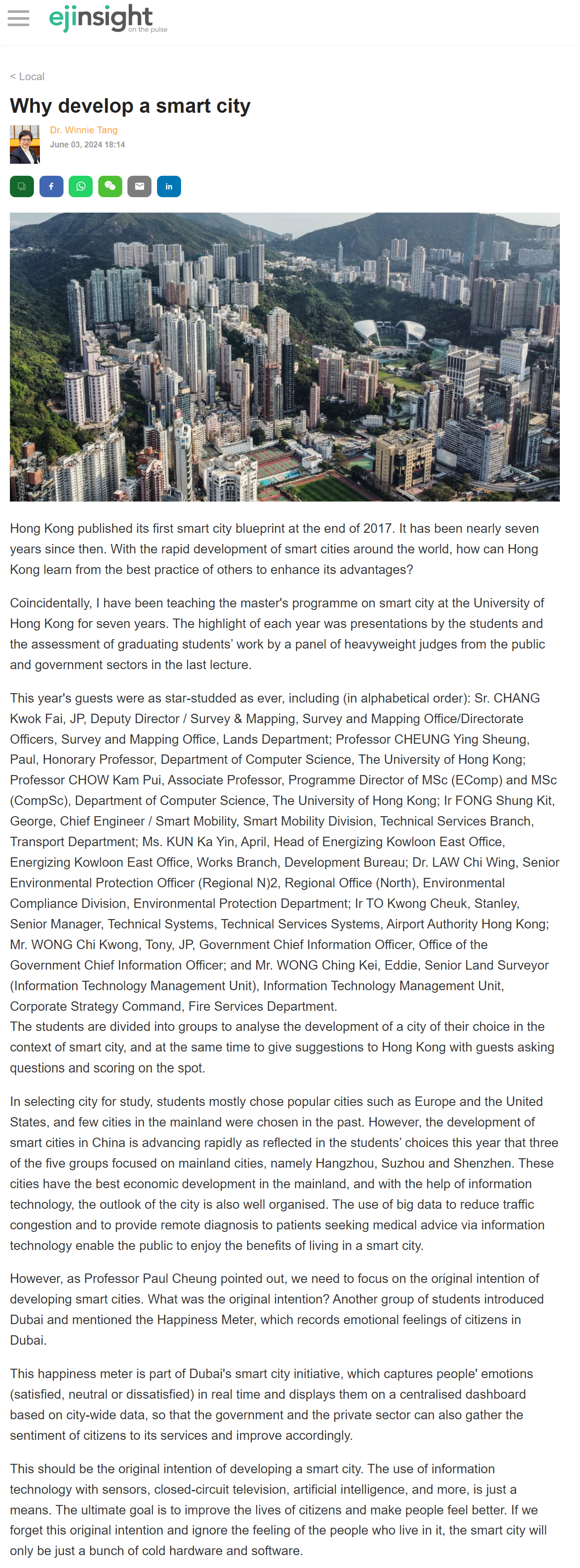網上版請按此

Why develop a smart city
Hong Kong published its first smart city blueprint at the end of 2017. It has been nearly seven years since then. With the rapid development of smart cities around the world, how can Hong Kong learn from the best practice of others to enhance its advantages?
Coincidentally, I have been teaching the master's programme on smart city at the University of Hong Kong for seven years. The highlight of each year was presentations by the students and the assessment of graduating students' work by a panel of heavyweight judges from the public and government sectors in the last lecture.
This year's guests were as star-studded as ever, including (in alphabetical order): Sr. CHANG Kwok Fai, JP, Deputy Director / Survey & Mapping, Survey and Mapping Office/Directorate Officers, Survey and Mapping Office, Lands Department; Professor CHEUNG Ying Sheung, Paul, Honorary Professor, Department of Computer Science, The University of Hong Kong; Professor CHOW Kam Pui, Associate Professor, Programme Director of MSc (EComp) and MSc (CompSc), Department of Computer Science, The University of Hong Kong; Ir FONG Shung Kit, George, Chief Engineer / Smart Mobility, Smart Mobility Division, Technical Services Branch, Transport Department; Ms. KUN Ka Yin, April, Head of Energizing Kowloon East Office, Energizing Kowloon East Office, Works Branch, Development Bureau; Dr. LAW Chi Wing, Senior Environmental Protection Officer (Regional N)2, Regional Office (North), Environmental Compliance Division, Environmental Protection Department; Ir TO Kwong Cheuk, Stanley, Senior Manager, Technical Systems, Technical Services Systems, Airport Authority Hong Kong; Mr. WONG Chi Kwong, Tony, JP, Government Chief Information Officer, Office of the Government Chief Information Officer; and Mr. WONG Ching Kei, Eddie, Senior Land Surveyor (Information Technology Management Unit), Information Technology Management Unit, Corporate Strategy Command, Fire Services Department.
The students are divided into groups to analyse the development of a city of their choice in the context of smart city, and at the same time to give suggestions to Hong Kong with guests asking questions and scoring on the spot.
In selecting city for study, students mostly chose popular cities such as Europe and the United States, and few cities in the mainland were chosen in the past. However, the development of smart cities in China is advancing rapidly as reflected in the students' choices this year that three of the five groups focused on mainland cities, namely Hangzhou, Suzhou and Shenzhen. These cities have the best economic development in the mainland, and with the help of information technology, the outlook of the city is also well organised. The use of big data to reduce traffic congestion and to provide remote diagnosis to patients seeking medical advice via information technology enable the public to enjoy the benefits of living in a smart city.
However, as Professor Paul Cheung pointed out, we need to focus on the original intention of developing smart cities. What was the original intention? Another group of students introduced Dubai and mentioned the Happiness Meter, which records emotional feelings of citizens in Dubai.
This happiness meter is part of Dubai's smart city initiative, which captures people' emotions (satisfied, neutral or dissatisfied) in real time and displays them on a centralised dashboard based on city-wide data, so that the government and the private sector can also gather the sentiment of citizens to its services and improve accordingly.
This should be the original intention of developing a smart city. The use of information technology with sensors, closed-circuit television, artificial intelligence, and more, is just a means. The ultimate goal is to improve the lives of citizens and make people feel better. If we forget this original intention and ignore the feeling of the people who live in it, the smart city will only be just a bunch of cold hardware and software.
Dr. Winnie Tang
Adjunct Professor, Department of Computer Science, Faculty of Engineering; Department of Geography, Faculty of Social Sciences; and Faculty of Architecture, The University of Hong Kong